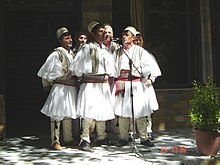Albanian music
| Music of Albania | |
|---|---|
 |
|
| General topics | |
| Genres | |
|
|
| Specific forms | |
| Media and performance | |
| Music festivals | |
| Music media |
|
| Nationalistic and patriotic songs | |
| National anthem | |
| Other |
|
Albanian music (Albanian: Muzikë popullore or Muzikë shqiptare) displays a variety of influences. Albanian folk music traditions differ by region, with major stylistic differences between the traditional music of the Ghegs in the North and Tosks in the South. Since the 1920s, some composers such as Fan S. Noli have also produced works of Albanian classical music. One of the most important venues exhibiting traditional Albanian music is the Gjirokastër National Folklore Festival held every five years in Gjirokastër, southern Albania.
Albania's political, military and cultural domination by outside elements have contributed to the country's modern music scene. Albanian music is a fusion of the music of Southeastern Europe. However, the Albanian people kept maintained vast cultural identity away from their overlords, with many living in rural and remote mountains.
Albanian folk music falls into three stylistic groups, with other important music areas around Shkodër and Tirana; the major groupings are the Ghegs of the north and southern Labs and Tosks. The northern and southern traditions are contrasted by the "rugged and heroic" tone of the north and the "relaxed, gentle and exceptionally beautiful" form of the south. These disparate styles are unified by "the intensity that both performers and listeners give to their music as a medium for patriotic expression and as a vehicle carrying the narrative of oral history", as well as certain characteristics like the use of rhythms such as 3/8, 5/8 and 10/8. The first compilation of Albanian folk music was made by Pjetër Dungu in 1940.
Albanian folk songs can be divided into major groups, the heroic epics of the north, and the sweetly melodic lullabies, love songs, wedding music, work songs and other kinds of song. The music of various festivals and holidays is also an important part of Albanian folk song, especially those that celebrate St. Lazarus Day (the llazore), which inaugurates the springtime. Lullabies and laments are very important kinds of Albanian folk song, and are generally performed by solo women.
...
Wikipedia
